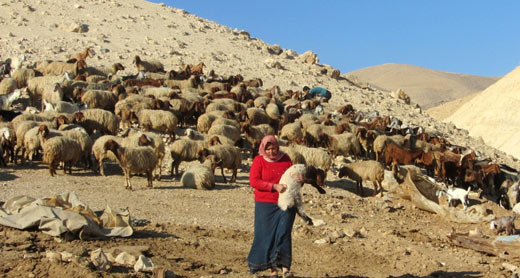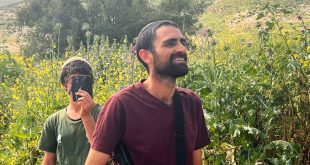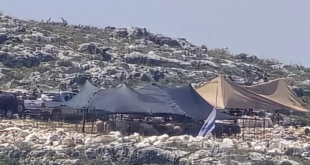The Civil Administration has filed for objections plans for establishing a new settlement in the Jordan Valley, where thousands of Bedouins will be forced to relocate. The Civil Administration is advancing several such plans.
The current plan was drawn up without consulting the residents themselves, ignoring their needs. It is part of the Civil Administration’s repeated attempts to concentrate the Bedouins living in the West Bank’s Area C in “permanent sites”, with a view to annexing most of this area to Israel and leaving it free for Israeli use, including settlement expansion.
The new settlement, to be named Ramat Nu’eimeh, will be built in Area C near Jericho, in the Jordan Valley, and is slated to house about 12,500 people from Bedouin communities in the Jordan Valley and the Ma’ale Adumim area.
The first three plans for the settlement were filed for objections on 25 August 2014. They included a settlement intended for the Rashaydah tribe, which currently lives in the area, and a road running between the two settlement clusters. On 9 September 2014, three more plans were filed – two for building residences and one for constructing a road. Local residents and Israeli human rights organization Bimkom plan to submit several objections to these plans.
The plans were made without consulting the residents, who were not notified of the scope of the plans, and were therefore unable to present their position and make their needs known. The plans ignore the residents’ agrarian way of life and will not allow them to continue shepherding as before. The new settlement will be surrounded from all sides, in part by firing zones, settlements and a military checkpoint, leaving the residents without grazing pastures for their livestock. In addition, the plans force different tribes and communities to live together, contrary to traditional practices.
Most Bedouins living in the West Bank arrived there after they left their homes in the Negev desert, in southern Israel, or were expelled from them, in 1948. Ever since Israel occupied the West Bank in 1967, they have been forced to relocate several times to allow for Israeli settlements, firing zones, new nature reserves declared, and more. Hundreds of demolition orders have been issued against their homes and entire communities have been repeatedly expelled.
Israeli authorities, and particularly the Civil Administration, which oversees these matters, have refrained from making master plans that meet these residents’ needs and allow them to continue living according to traditional practice. The authorities have never recognized any rights the residents may have to the land. As a result, Bedouin residents suffer from a very low standard of living: they are not connected to the power grid, only some are connected to the water grid, and their access to basic services such as health and education is extremely limited. Their main source of income is shepherding, but the Israeli authorities limit their access to grazing pastures and markets.
According to the Civil Administration, the plan’s objective is to improve the standard of living in these communities and to provide proper housing conditions. The spokesperson of the Coordinator of Government Activities in the Territories (COGAT) said, in response to an article published in Israeli daily Ha’aretz on the matter, that the purpose of the new settlement is to “allow the community to settle in an organized area with proper, suitable infrastructure”.
However, if the Civil Administration had the best interests of these communities in mind, it would have consulted with them in the planning stages and prepared plans that meet their needs and allow them to continue their way of life. Instead, the Administration is forcing upon them a plan that dictates an extreme change to their lifestyle, denies their sources of livelihood, and may destroy their communities.
The Civil Administration has previously forced Bedouin communities into permanent housing: during the 1990s, the Civil Administration built a settlement near the Abu Dis landfill and expelled members of the al-Jahalin tribe from their homes to live at the site in order to make way for the expansion of the Ma’ale Adumim settlement. That site was also planned without consulting the residents. In addition to the harsh impacts of living near a landfill, relocation to the new site destroyed the Bedouin way of life, harming the residents and community life. The land allocated to each family was not large enough to house livestock and the army restricted access to grazing pastures that had been promised. As a result, only 30% of the residents have continued to earn a living as shepherds.
The current plan is part of concerted efforts made by various Israeli authorities, over decades, to expel thousands of Palestinians living in dozens of communities scattered throughout Area C from their homes. Israeli officials have repeatedly declared their intent to take over Area C in order to create circumstances that would facilitate its annexation to Israel in a permanent agreement, and to annex it de-facto until then.
The Civil Administration’s plan runs counter to the provisions of international humanitarian law, which prohibit the forcible transfer of protected persons, unless it is carried out for their own protection or for an imperative military need. Even when the transfer meets these criteria, it must be temporary. The current case clearly fails to fulfil these conditions. Moreover, as representatives of the occupying power, Israeli authorities have an obligation to work for the benefit and welfare of the residents of the occupied territory. The plan to expel these residents from their homes, as well as impose living conditions on some that would undermine their source of livelihood, is a breach of this duty. It is clearly meant to advance political objectives entirely unrelated to the obligations of an occupying power.
The Civil Administration must withdraw the plans for establishing Ramat Nu’eimeh immediately. It must allow Bedouin communities to pursue their way of life, plan their communities and build their homes lawfully. It must connect them to infrastructure and provide them with basic health and education services.

 العربية
العربية עברית
עברית Türkiye
Türkiye Русский
Русский Français
Français We Watch Israeli Violations Specialized website in monitoring and documenting Israeli violations against Palestinians
We Watch Israeli Violations Specialized website in monitoring and documenting Israeli violations against Palestinians






